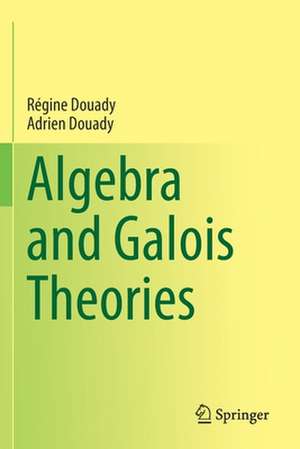Algebra and Galois Theories
Autor Régine Douady, Adrien Douady Traducere de Urmie Rayen Limba Engleză Paperback – 14 iul 2021
This book is aimed at graduate students and mathematicians curious about a non-exclusively algebraic view of Galois theory.
| Toate formatele și edițiile | Preț | Express |
|---|---|---|
| Paperback (1) | 465.52 lei 6-8 săpt. | |
| Springer International Publishing – 14 iul 2021 | 465.52 lei 6-8 săpt. | |
| Hardback (1) | 543.34 lei 6-8 săpt. | |
| Springer International Publishing – 14 iul 2020 | 543.34 lei 6-8 săpt. |
Preț: 465.52 lei
Nou
Puncte Express: 698
Preț estimativ în valută:
89.08€ • 93.24$ • 74.14£
89.08€ • 93.24$ • 74.14£
Carte tipărită la comandă
Livrare economică 31 martie-14 aprilie
Preluare comenzi: 021 569.72.76
Specificații
ISBN-13: 9783030327989
ISBN-10: 3030327981
Pagini: 462
Ilustrații: XXIII, 462 p. 33 illus., 6 illus. in color.
Dimensiuni: 155 x 235 x 34 mm
Greutate: 0.68 kg
Ediția:1st ed. 2020
Editura: Springer International Publishing
Colecția Springer
Locul publicării:Cham, Switzerland
ISBN-10: 3030327981
Pagini: 462
Ilustrații: XXIII, 462 p. 33 illus., 6 illus. in color.
Dimensiuni: 155 x 235 x 34 mm
Greutate: 0.68 kg
Ediția:1st ed. 2020
Editura: Springer International Publishing
Colecția Springer
Locul publicării:Cham, Switzerland
Cuprins
Introduction.- Chapter 1. Zorn’s Lemma.- Chapter 2. Categories and Functors.- Chapter 3. Linear Algebra.- Chapter 4. Coverings.- Chapter 5. Galois Theory.- Chapter 6. Riemann Surfaces.- Chapter 7. Dessins d’Enfants.- Bibliography.- Index of Notation
Recenzii
“This book covers a lot of interesting material and is surely a valuable addition to the literature, but is certainly not for the timid. It brings together a broad array of sophisticated mathematics … and it does so in a very general and abstract way, with an exposition that gives whole new meaning to the word ‘concise’.” (Mark Hunacek, MAA Reviews, April 5, 2021)
Notă biografică
Adrien DOUADY was born in 1935. After receiving his Ph.d. in mathematics in the field of complex analytic geometry, he later joined the University Paris-Sud (Orsay). A recipient of the Ampere prize, he was a member of the French Academy of Sciences, as well as of the highly influential informal Bourbaki group. Throughout his life, he remained interested in several areas. Yet his odyssey always brought back to complex numbers. He passed away in 2006, and is notably survived by his wife, Regine Douady.
Regine Douady, born in 1934, after a Ph.d. in the didactics of mathematics, she became a lecturer at the University Paris Denis-Diderot, as well as the head of the IREM (Institut de Recherche sur l' Enseignement des Mathematiques). She was made a chevalier dans l'ordre des palmes academiques. Now retired, she has ceaselessly endeavoured to introduce into teaching the necessity to address concepts from different standpoints-the motivating idea behind this book.
Textul de pe ultima copertă
Galois theory has such close analogies with the theory of coverings that algebraists use a geometric language to speak of field extensions, while topologists speak of "Galois coverings". This book endeavors to develop these theories in a parallel way, starting with that of coverings, which better allows the reader to make images. The authors chose a plan that emphasizes this parallelism. The intention is to allow to transfer to the algebraic framework of Galois theory the geometric intuition that one can have in the context of coverings.
This book is aimed at graduate students and mathematicians curious about a non-exclusively algebraic view of Galois theory.
This book is aimed at graduate students and mathematicians curious about a non-exclusively algebraic view of Galois theory.
Caracteristici
This book aims to transfer geometric intuition to the algebraic framework of Galois theory Gives a parallel presentation of Galois theory and the theory of covering spaces and highlights this similarity between the two Useful both for undergraduates and graduates, as well as to any researcher wishing to go beyond a purely algebraic approach to Galois theory
